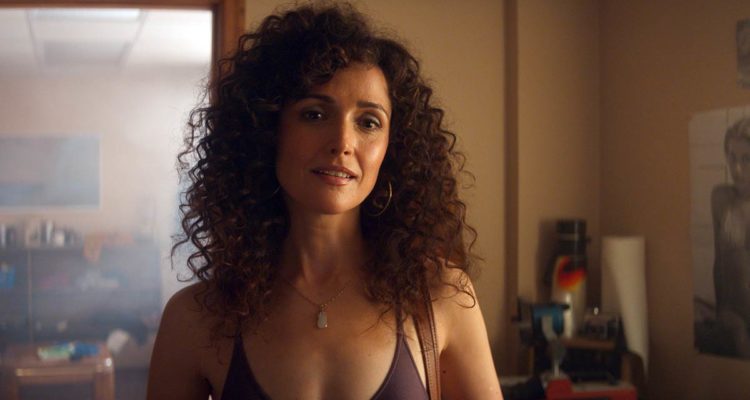In Apple TV+’s deliciously dark comedy “Physical,” central protagonist Sheila Rubin, played brilliantly and compassionately by Rose Byrne, transforms from a San Diego housewife trying to make ends meet to the head of an incredibly lucrative and influential video aerobics empire. In the process, viewers meet two versions of Sheila, the first is a gorgeous, spandex-clad instructor with a gleaming white smile and an affect so enthusiastic it seems almost impenetrable, and the second is a deeply traumatized and self-critical housewife who struggles with incredibly low self-esteem and a terrible body image.
Set in the early 1980s, “Physical” explores the era of excess through the eyes of Sheila, who is struggling to navigate her role as wife and mom while battling crippling self-doubt. She and her husband Danny met as activists in college in the ‘60s but now find themselves thrust into a world in which their hippie ideals have fallen out of fashion. Though both of them blame the changing times for their lack of financial success, the reality is that both Sheila and Danny continue to be stuck in old bad habits like Danny’s constant womanizing (often with college co-eds) and Sheila’s disordered eating. They love each other, but their individual insecurities strain their ability to communicate their real desires, and the couple is constantly backsliding into the roles they’ve come to play over the years they’ve been together, often losing sight of their real wants and needs.
READ MORE: Summer TV Preview: Over 40 Series To Watch
The heart of “Physical” is about Sheila’s desire to be seen and her paradoxical fear of being in the spotlight. One of the great successes of the series is allowing the audience to be privy to Sheila’s constant stream of negative self-talk, which cascades over every scene like a cruel and violent wave. Other recent shows like “Fleabag” and “I Hate Suzie” have wrestled with messy female protagonists, but Sheila is offered a unique kind of compassion since we are allowed to literally enter her mind and understand the extent of her disordered thinking. This choice allows viewers to empathize with Sheila and to rally behind her journey to greater self-empowerment, even though she makes a number of questionable decisions, some of which seem to be acting against her own self-interest.
READ MORE: The 25 Best TV Shows & Mini-Series Of 2020
“Physical” is not just interested in studying Sheila’s private experience of the world, but in interrogating the social pressures that actively encourage individuals to adopt dangerous coping mechanisms. Throughout the series, Sheila’s negative self-talk is portrayed as not just random insecure and cruel ruminations, but evidence of a culture that actively encourages self-hate. This can be seen in the way that Sheila’s friend Greta mirrors her self-loathing sentiments, even though she deals with her insecurities through sharing her feelings, rather than hiding them from view. Though Sheila pities Greta when she first interacts with her, and internally judges her for her body size, Greta’s character consistently demonstrates how a willingness to be vulnerable allows her to forge meaningful relationships and overcome some of her own toxic patterns.
READ MORE: The 65 Most Anticipated TV Shows & Mini-Series Of 2021
In the same way, the series handles Sheila’s eating disorder with tremendous compassion. Each time Sheila has a bulimic episode, the scene is shot so that viewers don’t just see the ritual of overeating but also the barrage of negative self-talk that leads her to binge and purge. The format allows viewers to understand the dangerous path that Sheila is going down, while also never veering into scenes that feel cruel, exploitative, or gratuitous. Indeed, the moments of dark comedy often come from the way the series refuses to reduce any of the characters to their stereotypical personas. The aging hippies, cheery co-eds, religious fundamentalists, icy wasps, and aerobics-obsessed housewives are all shown to be more complicated and nuanced than you might imagine at first glance.
READ MORE: 10 TV Shows To Watch In June: ‘Lisey’s Story,’ ‘Loki, ‘Physical’ & More
Like “Mad Men” and “The Marvelous Mrs. Maisel,” one of the pleasures of watching “Physical” is in the attention to detail. The ‘80s aesthetic is evoked through homes filled with dark wood paneling and avocado countertops, through wildly teased hair and chunky jewelry, through troll dolls and home entertainment systems that are as huge and boxy as they are low resolution. And yet, what is most strange and exhilarating about entering a world from decades ago is not the nostalgia factor, but in noticing the ways in which attitudes from the past continue to persist today. The age of VHS aerobics tapes may be over, but one only needs to spend a few minutes on Instagram and Tik Tok to see the huge number of influencers encouraging women to achieve their best selves through various fitness, fashion, and lifestyle trends.
In this way, “Physical” daringly reimagines the ‘80s cliché of the aerobics obsessed housewife, offering a subversive take on what it means to be successful in a culture that continues to value the appearance of success over actual well-being. By probing Sheila’s mental health with care, complexity, and humor, we’re offered a fresh new kind of female antihero, one that isn’t just meant to be a compelling character study, but an engrossing exploration of the ways that American empowerment culture continues to fail us all. [A]
“Physical” debuts on Apple TV+ on June 18.

